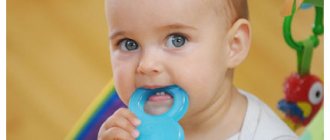Bruxism. This medical term refers to the involuntary contraction of the masticatory muscles, during which a characteristic creaking sound is heard. At the same time, this phenomenon is not isolated as a separate disease, but is not accepted as the norm. Based on the frequency of occurrence, two forms of pathology are distinguished: daytime and nighttime. The second occurs more often, but does not pose a serious threat to health, while the first is much less common, but can manifest itself as an alarming symptom of disorders in the body.
Statistics say that 50% of children aged 0 to 8 years are susceptible to bruxism, which, once the upper limit is reached, goes away on its own and often does not require special therapy. We have already written about nighttime bruxism, but what is the cause of this common phenomenon and how to deal with it?
Why does squeaking occur in young children?
In children aged 0 to 1 year, the causes of teeth grinding are primarily due to the development of:
- A common cause in infants is teething. Inflammation and injury to the gums causes discomfort and pain, which the baby tries to get rid of by clenching his jaws, thus producing a kind of massage.
- The anomaly often manifests itself during weaning, as well as when giving up pacifiers and bottles with nipples. The baby's residual sucking reflex is triggered, which provokes the grinding.
- Learning about your body is a stage in a child’s development. When a baby gets its first teeth, it studies them in this unusual way.
- Also, kids are susceptible to stress, no less than others. Everything is new and scary for them. In this case, daytime manifestations are a reaction to a stressful situation.
Note! Sometimes a bad habit is hidden under the guise of childhood bruxism. The child just liked the creaking sound and reproduces it periodically.
Further maturation and development usually nullify this feature. Moreover, more significant reasons occur at the age of 1 year. Let's look at them.
Why does a child grind his teeth in his sleep?
— When should you see a dentist if your child grinds his teeth?
— Teeth grinding in babies can often be heard when baby teeth are cutting through or when they are replaced by molars. Such processes are accompanied by itching and discomfort; the baby tries to “scratch” his teeth and grinds them. During teething, daytime bruxism is observed. Pathology in the form of malocclusion, as well as diseases of the jaw joints, are manifested by night grinding. In all of the above situations, consultation with a dentist is necessary. During the examination, the doctor will help you choose treatment.
- Which one, for example?
— If teeth are damaged, they must be treated. The crown part can be restored with composite materials or an individual crown; fluoridation is used for strengthening. Damaged nerves will have to be removed, as will the tooth itself if it has decayed too much.
For bruxism in children over 10 years of age, mouth guards are allowed to be used. This device, made of soft material, fits over the teeth and protects them from friction and subsequent damage. You can buy a ready-made mouthguard at a pharmacy, but it is better to make an individual one - based on a cast of the jaw. There is not a single person whose shape of the dental arches of the upper and lower jaws would be similar. They are like fingerprints, so it will be of no use if you buy “just a mouthguard”; it is impossible to adjust it individually.
— How to use a mouthguard correctly?
“She puts on her clothes at night, and in the morning she takes off and washes the inside with running water. There are practically no differences between children's and adult mouthguards - only in size. Moreover, perhaps, in the degree of rigidity of the material. For a child, they may prescribe the production of not just one, only on the upper or lower jaw, but on both at once. During bruxism in a child, baby teeth are at greater risk of being broken or losing enamel that is weaker than that of permanent teeth.
— How does the mouthguard work?
— It prevents the teeth from closing when the jaw muscles experience spasm during sleep. Over time, jaws with mouthguards remember the position in which they find themselves due to their presence. The collision of the dental surfaces of the upper and lower jaws is not so harsh, the contact is shock-absorbing.
Doctors have established a connection between the use of a mouthguard for bruxism and a reduction in the risk of apnea (short-term, from seconds to a minute, stopping breathing during sleep - editor's note). It reduces muscle pain. If the bite is incorrect, the use of overhead splints prevents the further development of pathology. In addition, the mouthguard evenly distributes the load on the teeth and prevents deformation of braces or permanent dentures in adults. The prerequisites for loose teeth disappear.
— Why is bruxism dangerous?
— If night grinding continues for quite a long time, then the child may develop an incorrect bite, destruction of tooth enamel, which leads to inflammation of periodontal tissues and caries, spasm of the facial muscles.
Why does squeaking occur in older children?
The main causes of anomalies in older age include:
- Incorrect bite formation and pathologies of the jaw structure
The anomaly may appear due to congenital structural features of the maxillofacial structure (pathology of the skull bones, malformations of the masticatory muscle, etc.) or due to malocclusion acquired for various reasons. More often, such disorders are caused by heredity, which makes itself felt already at the age of 2 to 3 years. The essence of the process is the rubbing of the upper and lower jaws against each other, hence the creaking. A dentist or orthodontist will help eliminate or correct the problem.
- Diseases of the ENT organs
These include enlarged adenoids, polyps and bronchitis. Most children grind their teeth during illness. After therapeutic measures, the creaking goes away along with the main problem.
- Inheritance factor
If your parents or immediate family have had bruxism, it is more likely to manifest itself. Genetic predisposition can serve as the primary source of grinding, but is not the main one among the others. That is, you shouldn’t blame everything on heredity; it’s better to consult a pediatrician. Perhaps this is an individual reaction to a number of stimuli.
- Emotional overload, stress, nervous tension, lack of sleep
The not yet formed child's psyche sometimes reacts to situations that are trivial and ordinary from the point of view of adults in the most unexpected way. The adaptation period in a preschool institution, the beginning of the school year at school, an unhealthy environment at home or in society can “result” in deviation.
- Vitamin deficiency and lack of essential macro- and microelements
A banal lack of vitamins is expressed in spasms and disruption of the proper functioning of muscle structures, including the masticatory muscle. Therefore, during the off-season, doctors recommend giving vitamin complexes containing magnesium, B vitamins and calcium.
- Malfunctions of the central nervous system
Neurologists put forward this hypothesis. There is some truth in this: impaired activity of the nervous system, neurological inflammatory processes, such as the trigeminal nerve, provoke dysfunction of the masticatory muscle.
When a child grinds his teeth...
When a child grinds his teeth...
We have my son’s birthday at the end of April, then his birthday. sisters are coming, and then Dr. our mother, whom we don’t want to see or hear. 2 weeks before due date I started twitching with my son, I even cried, and when my sister and mother came, I made such a fuss that the child was in shock: both the one who was already there and the one who was still in the stomach, and this made it doubly offensive. After that, and for three weeks now, my son has been grinding his teeth every now and then during the day.
Of course, I want it to pass sooner, for this I need more positivity, but I just can’t tune in to it, the resentment towards my relatives is so strong. Well, at least I found what to do in our case, if it squeaks, you need to distract it, repeat animal sounds, etc.: “ Distract the baby’s attention during the day. If your child has developed a habit of grinding his teeth during daytime play, then it’s time to distract him with something else. For example, conduct classes with language development, repeat the sounds of various animals, describe what is happening around.”
Well, at least something can be done, and that’s good.
Cindy
https://propochemu.ru/pochemu-rebenok-skripit-zubami.html
Why does a child grind his teeth? Category: Children
Parents are sometimes interested in why their child grinds his teeth. It’s one thing when all you can hear in a child’s room is quiet snoring, and it’s completely different when a terrible grinding noise is heard. Most often, the grandmother’s verdict “If the baby grinds his teeth, it means he has worms” turns out to be incorrect, so we have to look for reasons elsewhere. It’s scary that as a result of such a bad habit, the child’s baby teeth will begin to deteriorate, leading to further problems with permanent teeth...
Why does a child grind his teeth?
Some experts say that the true causes of bruxism (teeth grinding) cannot be established. Others at this time successfully put forward several assumptions and find ways to solve the problem. In any case, it is better to try different options for solving the situation than to hope that everything will go away on its own.
Bruxism usually appears between 2 and 3 years of age, gradually subsiding by 6 years of age. If parents of children somehow fix the problem on their own, then in older age, teeth grinding clearly requires consultation with various specialists. Most often, a child grinds his teeth in his sleep for the following reasons:
- Heredity. If one of the parents suffered from bruxism in childhood, then with a high degree of probability children can inherit this reaction to various stimuli. Boys are more likely than girls to scare their parents with strange sounds at night. But this does not mean that the son will necessarily continue the fate of his parents.
- Stressful situations. The child's nervous system is constantly subject to overstrain. It’s good when the family has all the conditions for the full development of the baby and a peaceful night’s rest. But sometimes excessive emotional stress, an unfavorable atmosphere in the house, and even mental shock while playing on an outdoor playground leads to grinding of teeth during sleep. This reason is easily identified by the frequency of its occurrence and the relationship with the emotions experienced over the past few days.
- Malocclusion. The older the baby gets, the better his dental system is formed. Dental disorders in this area lead to muscle tension during night rest. Thus, the body tries to grind the teeth against each other in order to align the bite in the required direction. A consultation with a dentist will rule out or confirm the possibility of a malocclusion.
- Teething. During teething, the gums become itchy and painful. Parents first begin to panic: “The child is not eating well, what should I do?”, and then they notice the appearance of a grinding sound at night. One problem begins to add to another. However, as teeth grow, worries about both poor appetite and manifestations of bruxism gradually subside.
- Various diseases. Even though the settlement of parasites in the body is unlikely, it still wouldn’t hurt to check for the presence of helminths in the body. Also, breathing problems due to adenoids, sinusitis or polyps lead to a lack of saliva in the mouth. During teeth grinding, salivation begins to increase, which alleviates the baby's condition. Based on test results and preliminary examination, the pediatrician will rule out the possibility of the disease or prescribe the necessary treatment.
What to do if your child grinds his teeth during the day or at night:
- Use sedatives. This involves adding a herbal decoction to a warm bath before bed or using aromatherapy in the room. Evening walks, quiet activities before bed and a light dinner help create a favorable environment for relaxing the nervous system.
- Add load to the jaw during the daytime. Solid foods (carrots, apples) relieve muscle tension, providing the necessary level of load on the jaw throughout the day.
- Checking the baby's health. Taking various tests will help determine whether everything is in order in the child’s body. A consultation with a dentist will be useful not only to check your bite, but also to receive recommendations for dental care.
- Make teething easier. Special gels and gum massage will help the baby go through the period of teeth growth easier.
- Distract your baby's attention during the day. If your child has developed a habit of grinding his teeth during daytime play, then it’s time to distract him with something else. For example, conduct classes with language development, repeat the sounds of various animals, describe what is happening around.
The vast majority of bruxism goes away on its own, with a little help from parents. If teeth grinding continues for more than 30 minutes or causes serious concern in adults, then you should consult a specialist. If necessary, you can purchase special dental veneers.
https://berena.ru/text/pochemu-rebenok-skripit-zubami
Quite often, children's teeth grinding when clenching their jaws is called bruxism. It occurs mainly in young children and goes away in almost all of them by school time. But many parents are still concerned about why their child grinds his teeth , what causes it?
If attacks of teeth grinding are not frequent and last several minutes, then they should not cause concern. But in the case when they last for 30 minutes and several times in one night, you need to pay serious attention to dental health and try to find out why bruxism manifests itself in your child. There are the following generally accepted causes of teeth grinding:
- Malocclusion is a hereditary disorder, the peak manifestation of which occurs at the age of three. In this case, the child can be helped by a dentist.
- If the baby's teeth are still growing, he can simply try to scratch them and reduce the pain. In this case, bruxism will go away without outside intervention when all the baby teeth erupt.
- A baby may begin to grind their teeth during stress caused by weaning off a bottle, breastfeeding, or pacifier. In this case, the baby needs the support of his mother and over time everything will pass.
- Young children also experience muscle tension in the jaw, in which case the teeth need to be given loads during the day in the form of solid food (carrots, apples).
- Your child may have parasites in his body, but the likelihood that this is the cause of bruxism is very low. Just in case, it is necessary to undergo appropriate tests and undergo treatment if the answer is positive.
- Also, when breathing is impaired due to adenoids, sinusitis or polyps, children often begin to grind their teeth in order to produce the required amount of saliva. If you suspect you have one of these conditions, contact your otolaryngologist.
- The most common cause of bruxism is stress, which negatively affects the nervous system. Young children are very susceptible to changing external factors, such as their first trips to kindergarten, parental divorce, lack of communication with their mother, and many others. In such cases, the nervous system is overexcited and the child cannot calm down even at night. Soothing baths before bed, aromatherapy, a light dinner, and relaxing walks will help.
- It happens that with a lack of calcium, children also begin to grind their teeth, contact your pediatrician and ask for advice on this issue.
In most cases, bruxism in children goes away on its own, but if you have been observing this deviation for a long time and it causes concern, there are special dental guards. Also, talk to your baby and try to gently explain that teeth also want to sleep at night. If nothing helps, contact a specialist.
What are the consequences of bruxism?
The consequences of daytime grinding directly depend on the root cause of the anomaly, which is determined by the doctor. At the same time, a common feature is also observed: regardless of the etiology, constant clenching of the jaw affects the bite and harms the health of the teeth and gums.
In the future, if the problem is left unattended, the following pathologies develop:
- periodontal disease
- caries
- thinning of denta and tooth enamel due to constant friction
- change in bite
- early loss of both primary and permanent teeth
- dysfunction of the masticatory muscle and facial asymmetry
- hearing loss
Dental problems continue into adulthood. Therefore, if a baby grinds his teeth during the day or at night, parents should pay attention to the anomaly and begin to eliminate it.
Causes of daytime bruxism
Quite often, children begin to grind at two or three years of age. And by the time the child enters first grade, the attacks of bruxism go away on their own.
The reasons why a child grinds his teeth during the daytime may be:
- Increased emotional background.
Daytime bruxism in childhood is most often provoked by the child’s lack of ability to express his emotions and get rid of internal experiences. The baby is unable to hide his feelings and grinding his teeth is an expression of his negative emotions.
- Heredity
The next probable reason is a genetic predisposition to bruxism. If the baby’s parents themselves suffered from bruxism, then the likelihood that the baby will make similar sounds is very high.
- Individual reaction
Very rarely, teeth grinding can be a peculiar reaction to a certain irritant.
- Incorrectly formed bite
Malocclusion is a very common cause of bruxism. Children, trying to get rid of muscle tension due to incorrect positioning of teeth, begin to “grind in” them. This is why daytime bruxism occurs.
That is why, if a child grinds his teeth during the day, he needs to be shown to the dentist as soon as possible. Only a doctor will be able to identify the existing pathology of the dental system. If necessary, special onlays are prescribed that will protect the child’s tooth enamel from abrasion.
But doctors identify a group of specific causes of daytime bruxism in children:
- A baby may suffer from daytime bruxism during teething. And then the grinding is the baby’s attempt to relieve the pain in the inflamed gums.
- Sometimes bruxism is a bad childhood habit. The baby could one day accidentally make an unusual sound, and he liked it. And now the baby reproduces it at every opportunity.
- In very rare cases, grinding may indicate a severe lack of calcium in the baby's body. A deficiency makes the enamel very weak and therefore does not protect the teeth very well. And with the help of friction, the child tries to remove the unpleasant sensations.
Is therapy required?
A cause for concern and the need to consult a doctor is the frequency and duration of bruxism. Parents need to pay attention to the following points:
- if the squeak is repeated no more than 5-6 times throughout the day, this is normal
- The duration of the grinding noise is normally no more than 10-20 seconds
Such indicators indicate an excessive emotional background (negative or positive). Otherwise, when parents notice frequent and prolonged creaking, an examination becomes necessary.
You should also consult a doctor in cases where the age has passed the 7-8 years mark, and teeth grinding has not stopped, or signs of destruction of tooth enamel and inflammatory processes on the gums are noticed.
Malocclusion
This problem is solved in the dental office. Remember, the sooner you see a doctor, the easier it will be to correct it. Most often, special silicone tires are used, which are equipped with air shock absorbers. They can be worn from 3-5 years old.
They are made to order and inserted into the oral cavity before bedtime. If a child grinds his teeth during the day due to an orthodontic problem, then another splint is needed - unnoticeable, but preventing the closure of the dentition.
Visit to the dentist
It is recommended to begin the examination with a visit to the dentist (periodontist or orthodontist) to exclude congenital pathologies of the jaw structure and the formation of malocclusion. Minor deviations are removed using special rubber mouth guards and brace systems.
Infants do not need to visit the dentist. For teething, the pharmacological industry offers a variety of gels, ointments, tablets and special devices that alleviate painful symptoms.
Visit to a neurologist
Next, they visit a neurologist. The goal is to eliminate disruptions in the functioning of the central nervous system. If the problem is excessive emotional stress, mental fatigue, treatment is carried out by taking medicinal sedatives like Tenoten, relaxing baths, and evening walks.
In this matter, the emphasis is on the correct alternation of psychological, physical stress and rest. Another significant point in treatment is the organization of a healthy environment at home and sufficient attention from parents. By building a trusting relationship, you can eliminate not only teeth grinding, but other psychological problems in the future. This also applies to infants: during the period of pacifier withdrawal and weaning, the baby’s stress is effectively eliminated by maternal care and affection.
The remaining causes of the development of the anomaly are identified only through a comprehensive examination by specialists and, based on the results, adequate treatment is selected.
Preventive measures
It has already been said above about organizing a healthy home environment, but this is not the only way parents can support their child.
What else can be done to eliminate and prevent bruxism:
- impose a ban on active evening games and take walking as a rule so that the baby can fully rest and get enough sleep
- organize a complete diet and do not forget about the benefits of solid food for both the jaw and stomach
- give vitamin complexes to compensate for the lack of nutrients
It is also recommended to teach the child to control his emotions and ensure that, when free, the jaws do not close when the mouth is closed.
Even if you notice signs of daytime teeth grinding, there is no need to panic. A rational approach to the issue and timely diagnosis is already half the success.








